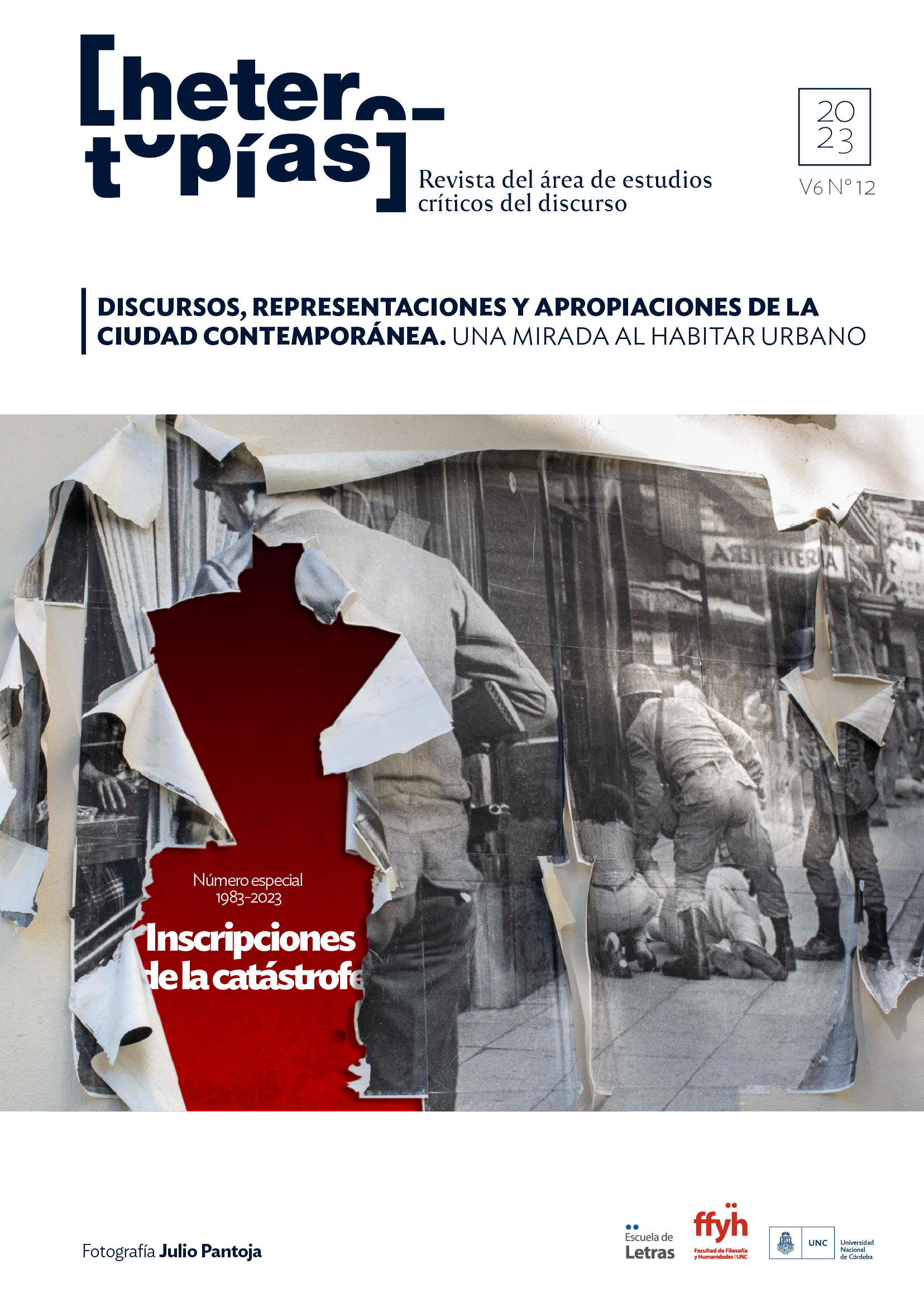Urban project, identity(ies) and contested places of memory in Córdoba, Argentina
Main Article Content
Abstract
In the cities of the south, urban transformation phenomena are increasingly taking place, specifically in central and traditional areas. In general, this brings architectural, morphological and use land changes, among others. That had an impact on the reproduction of memory, producing identity resignifications. This article analyses the meaning acquired by places of identity resignification in three sites in the Güemes neighbourhood as a result of urban renewal processes (La Cañada, the former prison of Encausados and Villa
el Pocito). Urban spaces accumulate forms-contents, material and symbolic instances, which reveal emotional relationships, feelings of belonging, experiences and inhabiting practices. The premise is the renewal processes have modified the reconstruction and the
forms taken by the identities and territorial dynamics of places of memory. The aim is to contribute to the debate on the impact of the execution of projects of a certain magnitude in consolidated areas. The methodological perspective is qualitative, firstly the elements that configure the space, then an approach to the experience and experimentation of each place and the link with the construction of identity(ies); summarise the meaning the places acquire.
Downloads
Article Details

This work is licensed under a Creative Commons Attribution-NonCommercial-ShareAlike 4.0 International License.
Those authors who have publications with this journal, accept the following terms: Those authors who have publications with this journal, accept the following terms:
a. The authors will keep their copyright and guarantee to the journal the right of first publication of their work, which will be simultaneously subject to the Creative Commons Attribution - Non-Commercial - Share Alike (by-nc-sa) Attribution License; no commercial use of the original work or any derivative works is allowed, the distribution of which must be done with a license equal to the one that regulates the original work.
b. Authors may adopt other non-exclusive license agreements for the distribution of the published version of the work (e.g., deposit it in an institutional telematic archive or publish it in a monographic volume) provided that the initial publication in this journal is indicated.
c. Authors are allowed and recommended to disseminate their work through the Internet (e.g. in institutional telematic archives or on their website) before and during the submission process, which may lead to interesting exchanges and increase the number of citations of the published work. (See The effect of open access).
How to Cite
References
Assmann, J., (2010) Communicative and Cultural Memory en A Companion to Cultural Memory Studies, Astrid Erll y Ansgar Nünning (eds.) 109-118, Berlin/ New York, Walter de Gruyter.
Bhagia, M., y Bose, M. (2023). Who owns the city? Neoliberal urbanism and land purchases in Gurgaon, India. Urban Studies, 0(0). https://doi.org/10.1177/00420980231184784
Boito, E. y Espoz, M. B. (2014). (Comp.), Urbanismo estratégico y separación clasista. Instantáneas de la ciudad en conflicto. Puño y Letra Editorialismo de Base, Rosario, Argentina.
Boixadós, M. C. (2000). Las Tramas de una ciudad, Córdoba entre 1870 y 1895. Élite urbanizadora, Infraestructura, poblamiento. Ferreyra editor, Córdoba, Argentina.
Erll, A. (2012) Memoria colectiva y culturas del recuerdo. Estudio introductorio Bogotá: Universidad de los Andes, facultad de Ciencias Sociales, Departamento de Lenguajes y Estudios Socioculturales, Centro de Estudios Socioculturales e Internacionales; Ediciones Uniandes, Kollektives Gedächtnis und Erinnerungskulturen. Eine Einführung. J.B. Metzlersche Verlagsbuchhandlung und Carl Ernst Poeschel Verlag GmbH in Stuttgart 2005 Revista Heterotopías, v 6, n 12 Área de Estudios Críticos del Discurso, FFyH, UNC Córdoba, diciembre de 2023. ISSN: 2618-2726 Halbwachs, M., La mémoire collective [1950], versión electrónica elaborada por Lorraine Andy y Jean-Marie Tremblay 2001.
<http://classiques.uqac.ca/classiques/Halbwachs_maurice/memoire_collective/memoire_collective.html> (11 de septiembre de 2023).
Hammerschmidt, C. (2021). Marcel Proust, Leopoldo Marechal, o las contradicciones de la modernidad. Recial, 12(19), 79–96.
https://doi.org/10.53971/2718.658x.v12.n19.33823
Marengo, C. (2021) Transformaciones urbanas y políticas públicas: reflexiones para una agenda de investigación en hábitat / María Cecilia Marengo ... [et al.]; editado por María Cecilia Marengo. - 1a ed compendiada. Córdoba: Editorial de la Facultad de Arquitectura, Urbanismo y Diseño de la Universidad Nacional de Córdoba.
Nora, P. (1984) "Entre mémoire et histoire", en Les lieux de mémoire. Tomo 1. La Republique, Pierre Nora (dir.). Paris, Gallimard, XV-XLII.
Ortiz, C. (2023) Writing the Latin American city: Trajectories of urban scholarship. Urban Studies, 1–27. Urban Studies Journal. DOI: 10.1177/00420980231184037
Pereyra, A. S. y Marengo, C. (2022) Habitar en contextos de renovación urbana: barrio Güemes, en Córdoba 2010-2015. Revista Arquitectura/Urbanismo/Sustentabilidad de la Universidad Austral de Chile.
Pereyra, A. S. (2021). Continuidades, tensiones y rupturas en las prácticas del habitar, en el marco de las transformaciones de barrios ‘tradicionales’. El Caso de barrio Güemes 2000-2016. Tesis doctoral del Doctorado en Estudios Urbano Regionales de la Universidad Nacional de Córdoba y la Bauhaus Universität Weimar. Publicada en: https://doi.org/10.25643/bauhaus-universitaet.4651
Sennett, R. (1997). Carne y Piedra. El cuerpo y la ciudad en la civilización occidental. Madrid: Alianza Editorial.
Theodore, N.; Peck, J. y Brenner, N. (2009) Urbanismo neoliberal: la ciudad y EL IMPERIO de los mercados. Revista Temas Sociales nº 66. www.sitiosur.cl
Tomadoni, C. (2021). Ordenamiento ambiental del territorio en clave de razón-emoción. Del saber ambiental al ordenamiento ambiental del territorio, 44-51. En: Carlos Romero / Sebastian Chirino (comp.): Territorio, innovación y esperanza. Reflexiones sobre la potencialidad de entramados socio-productivos en los barrios populares. San Juan: Ed. Universidad Nacional de San Juan.
Wallerstein, I. (2001). Unthinking Social Science: Limits of 19Th Century Paradigms. Temple University Press
